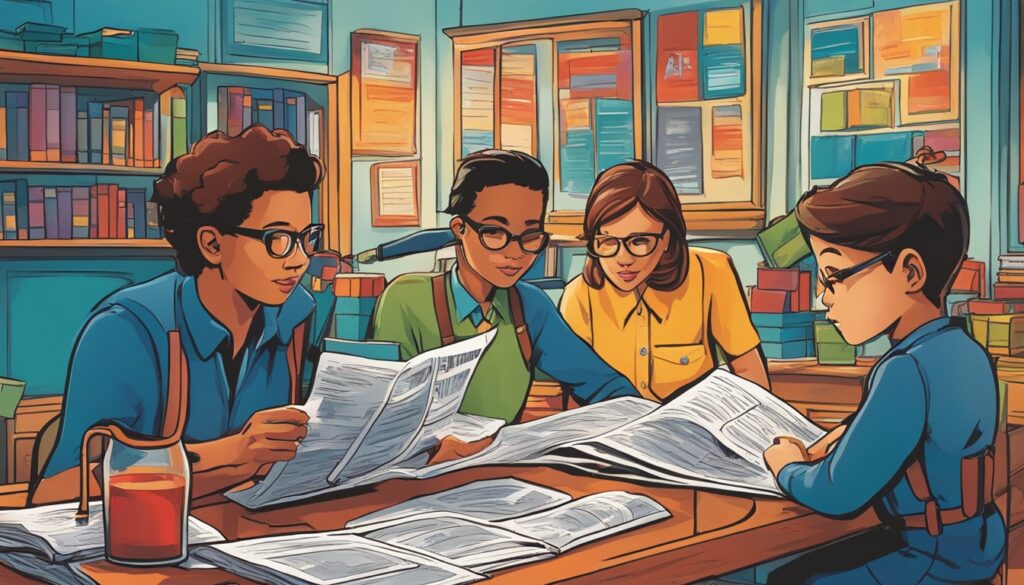In today’s fast-paced digital world, many of us struggle with reading & comprehension. Often, the challenge isn’t our vocabulary but our ability to understand and remember what we read. Recognizing this is the first step to improving our reading skills.
Researcher Jean Twenge found that students who spend a lot of time on social media tend to graduate with less focus on long texts. This affects their reading comprehension1. Teachers also say students find it hard to focus on longer texts1. This is why improving reading & comprehension is vital today.
Reading novels and longer texts takes time and effort1. But, it’s crucial for developing deep understanding. The National Council of Teachers of English suggests building reading stamina with nonfiction texts to master comprehension1. Graphic organizers help students slow down and engage more with what they read1.
Small, intentional actions during reading can greatly improve how much we take in and learn1. Studies show that writing or typing summaries helps students check and understand their reading2. These steps are great for anyone looking to improve their reading skills over time.
Key Takeaways
- Recognize the struggle with retaining and understanding reading material.
- Build reading stamina with nonfiction texts as recommended by educational experts.
- Leverage graphic organizers to slow down and better interact with texts1.
- Implement intentional outputs like summarizing to check comprehension2.
- Stay committed to reading longer texts for enhanced comprehension1.
- Actively engage with texts for better retention.
- Seek advice and strategies to boost reading proficiency.
Understanding Reading & Comprehension
Learning to understand what you read is key for doing well in school. It’s more than just reading words. It means taking in the text, linking it to what you know, and getting its full meaning.
What is Reading Comprehension?
Reading comprehension means you can read, process, and understand text. Good readers use what they already know and their experiences to get the message3. This makes reading more than just a simple task. It turns it into something interactive and meaningful.
Studies show that teaching comprehension helps students understand and remember what they read better3. This shows how important it is for learning.
The Importance of Reading Comprehension
Reading comprehension is vital for doing well in school. It starts with decoding and understanding language4. Skilled readers adjust their speed to fit the text’s level, which helps them improve their reading skills3.
Being good at comprehension lets students make sense of, judge, and connect information. This leads to deeper understanding and thinking critically5. It also boosts problem-solving, empathy, memory, and focus.
Effective Reading Strategies
Using effective reading strategies can really boost how well you understand and remember what you read. By actively engaging with the text, you can improve your grasp of the material through different techniques.
Previewing and Predicting
Previewing the text is a great way to get a feel for what it’s about and its structure. By looking at headings, subheadings, and summaries, you can guess the main topics. This helps you prepare mentally and makes it easier to understand new info.
Predicting what comes next also makes reading more interactive. It uses what you already know to make the text more engaging.
Making Connections
Linking new info to what you already know is another strong strategy. This creates a context that makes the information clearer and easier to remember. It’s a big help in understanding and keeping information in your memory.
Studies show that good readers adjust how they process information based on the text6.
Creating sensory images also helps you connect with the text on a deeper level. This makes it easier to remember what you read78.
Questioning Techniques
Asking questions is key to really getting what you’re reading. It helps you clarify confusing parts, make guesses, and understand the main ideas. This method combines thinking and reflecting on your thought process68.
Research shows that summarizing and visualizing what you read helps you remember the main points6. Questioning also lets you put together different pieces of information and see the big picture8.
Improving Reading Skills
Want to get better at reading? Start by setting clear goals and practicing regularly. These steps can make reading faster, easier, and more fun.
Setting Reading Goals
Setting specific goals is a great way to improve your reading. For example, by 3rd grade, kids should read 90 words per minute to get better at it9. Also, knowing 90% of a text’s words helps you understand it better9. Setting goals like these helps you track your progress.
Scholastic’s Branches books are great for helping kids move from picture books to chapter books9. You can also sign up for the Scholastic Parents newsletter for reading tips and a 10% discount on Scholastic Store Online9.
Practicing Consistently
Reading regularly is key to getting better at it. Reading aloud combines hearing and touching words, which helps you understand better10. It’s great for beginners because it makes you read slowly and carefully.
Talking about what you read before, during, and after can make you understand and remember it better9. Stick to reading books at your level to keep going and improve your skills.
Using graphic organizers can also help by organizing main ideas and details10. This tool keeps you focused and helps with complex texts, making reading fun and effective.
Comprehension Exercises for Better Understanding
Doing comprehension exercises helps improve reading skills a lot. There are many tools out there, like Super Teacher Worksheets. They offer exercises for students from 1st grade to middle school for just $19.95 a year11. Sites backed by NCTE and ILA also have over 2,000 reading materials you can download11.
These exercises cover different topics and levels for students from Grade 1 to Grade 1012. ReadTheory, for example, has been used by 7.4 million students, showing how effective online tools can be11. The texts on these platforms meet Common Core standards, focusing on important reading skills like making predictions and finding main ideas12.
Old stories, like Ferdinand Magellan’s 16th-century voyage, are key in these exercises13. About half of the questions are about his journey. There are also texts on Mount Vesuvius and Marie Curie’s Nobel Prize in chemistry13. This variety makes sure students get to read about interesting and diverse topics.
Close Reading Techniques
Close reading techniques make us better at understanding and analyzing texts. They push us to look closely at what we read. By annotating and summarizing, we can spot important points and think about what the author meant.
Annotating Text
Annotating text is key to deep reading. It means underlining, highlighting, and writing notes in the margins. This helps students grasp important ideas and understand the material better. It’s best to choose texts that are just right for their reading level14.
Annotation also helps us see how different ideas connect. This makes the material clearer to us.
Summarizing and Paraphrasing
Summarizing and paraphrasing are important in close reading. They force us to put complex ideas into simple words. This helps us focus on the main points and details.
It also helps us link new info with what we already know, making our understanding deeper15. We should read the text a few times first. Then, we can look at its structure and finally, see how it relates to other texts16.
Reading Comprehension Practice Tips
Improving reading comprehension takes more than one approach. Using structured practice workbooks and engaging in group discussions can make a big difference. These methods help you understand and remember more.
Using Practice Workbooks
Practice workbooks are great for improving reading skills. They offer exercises that make you think and answer questions about what you read. This helps you pay closer attention and understand better17.
Using these workbooks regularly challenges your brain and makes you think more deeply about what you read17. Summarizing what you’ve read also helps you remember the main points and what you learned17.
Engaging in Group Discussions
Group discussions are key for learning together. They let students practice and improve their reading skills17. By talking about what you read, you connect it to what you already know17.
These discussions also help you create mental pictures of what you’re reading, making it easier to understand and remember17. When you talk with others, you get to share your thoughts, ask questions, and summarize what you’ve read. This helps you get a better grasp of the material.
Building Critical Reading Skills
Learning to read critically is key for students to think deeply about texts. Studies show that it boosts academic success and sharpens critical thinking. It also helps people become better at reading and understanding texts18.
The SQ3R method is a useful strategy for critical reading. It means Survey, Question, Read, Recite, and Review. This method helps students from middle school to high school understand texts better18.
Helping students tell facts from opinions is part of critical reading. Critical thinking helps them understand the author’s goals and views19. The K-W-L method, for example, gets students ready for reading by using what they already know and setting goals20.
Another good strategy is Transactional Strategy Instruction (TSI). It helps students make sense of texts by predicting, questioning, clarifying, and summarizing20. Open discussions also help students think critically, letting them debate and talk in groups19.
Using different media, thought-provoking materials, and quality books can make students think more deeply. Teachers should keep teaching these skills to make critical reading a habit18.
In short, building critical reading skills uses many methods to get students to think deeply about texts. By using these strategies, teachers help students do well in school and in thinking critically.
Enhance Reading Comprehension with Metacognitive Strategies
Metacognitive strategies like self-monitoring and graphic organizers help readers understand their thoughts and see connections in texts. These methods improve independent thinking and self-control. They help students make their understanding clear and organize information better.
Self-Monitoring and Reflection
Self-monitoring is key to checking how well you understand and adjusting as you go. It’s based on knowledge, experience, and keeping track of your thoughts21. This skill makes a big difference in reading and controlling your thoughts22. But, high school students might find it hard because they don’t fully grasp basic reading skills22.
Using Graphic Organizers
Graphic organizers are tools that make information easier to structure and understand. They help students see how different parts of the text relate to each other23. Using these strategies, EFL learners can get better at reading and feel more confident, leading to better grades23. For example, programs like Fast ForWord improve these skills with exercises that make you think more actively22.
By using self-monitoring and graphic organizers, students can improve their reading skills on their own. This helps them do well in tough exams like TOEFL and IELTS23. Moving from old methods to these new strategies leads to lasting success in school and work23.
| Component | Experimental Group (EG) | Control Group (CG) |
|---|---|---|
| Pre-Test Score* | 50 students21 | 50 students21 |
| Post-Test Score* | t-value of 6.03 (significant)21 | t-table value of 2.0121 |
| Reading Improvement | High22 | Moderate22 |
| Use of Metacognitive Strategies | Consistent23 | Inconsistent23 |
Conclusion
Improving our reading skills can change our educational path and support lifelong learning. By setting goals and reading regularly, we can get better at understanding what we read. For example, readers who are motivated often set goals and share what they learn24. This makes learning to read more fun and rewarding.
Using strategies like thinking about what we read and reflecting on it also helps us understand better. Most good readers set goals before they start reading and check if they understand as they go25. These steps help us tackle tough texts and connect more with what we read, leading to better memory and understanding.
Being able to make guesses and conclusions from what we read is key to understanding texts fully. Many readers guess what’s happening without even thinking about it, like figuring out a car accident from sounds26. This skill lets us see the deeper meanings in texts, making reading more meaningful.
Mastering reading is about using good strategies and practicing a lot. By using these tips, we can improve our reading abilities and enjoy the benefits of being well-read. Let’s keep learning and make reading a key part of our growth.
FAQ
What is Reading Comprehension?
Why is Reading Comprehension Important?
What are Effective Reading Strategies?
How Can I Set Reading Goals?
What Are Some Common Comprehension Exercises?
How Do Close Reading Techniques Work?
What Are Some Tips for Reading Comprehension Practice?
How Can I Build Critical Reading Skills?
What Are Metacognitive Strategies for Enhancing Reading Comprehension?
Source Links
- Slowing Down the Reading Process to Build Students’ Comprehension Skills – https://www.edutopia.org/article/boosting-students-reading-comprehension-slowing-down/
- Reading Comprehension Tips – Learning Center – https://learningcenter.unc.edu/tips-and-tools/reading-comprehension-tips/
- Basics: Reading Comprehension – https://www.readingrockets.org/reading-101/reading-and-writing-basics/reading-comprehension
- The Simple View of Reading – https://www.readingrockets.org/topics/about-reading/articles/simple-view-reading
- Best Practices in Reading Comprehension: 6 Strategies to Teach Students – https://www.benchmarkeducation.com/blog/post/6-reading-comprehension-strategies-to-teach-students.html
- Teach the Seven Strategies of Highly Effective Readers – https://www.adlit.org/topics/comprehension/teach-seven-strategies-highly-effective-readers
- Strategies for Reading Comprehension :: Read Naturally, Inc. – https://www.readnaturally.com/research/5-components-of-reading/comprehension
- 7 Strategies to Improve Reading Comprehension – Connections Academy® – https://www.connectionsacademy.com/support/resources/article/an-introduction-to-using-effective-reading-comprehension-strategies/
- 6 Strategies to Improve Reading Comprehension – https://www.scholastic.com/parents/books-and-reading/reading-resources/developing-reading-skills/improve-reading-comprehension.html
- 10 Best Practices to Improve Reading Comprehension – Scholar Within – https://scholarwithin.com/10-best-practices-to-improve-reading-comprehension
- 11 Free Reading Comprehension Exercises Online | Resilient Educator – https://resilienteducator.com/classroom-resources/ten-free-reading-comprehension-exercises-online/
- Reading Comprehension Worksheets | Online or Printable – https://www.ereadingworksheets.com/free-reading-worksheets/reading-comprehension-worksheets/
- Reading Comprehension Practice Test 1 – https://www.testprepreview.com/modules/reading1.htm
- Close Reading Strategies: A Step-by-Step Teaching Guide – https://www.weareteachers.com/strategies-for-close-reading/
- Close Reading Tips and Tricks – https://creativeclassroomcore.com/close-reading-strategies-tips-and-tricks/
- Close Reading versus Reading Comprehension Strategies – https://www.fldoe.org/core/fileparse.php/7581/urlt/CloseReading.pdf
- Comprehension: In Practice – https://www.readingrockets.org/reading-101/reading-101-learning-modules/course-modules/comprehension/practice
- Teaching High School Students To Be Critical Readers – XQ – https://xqsuperschool.org/teaching-learning/teaching-high-school-students-critical-reading/
- How to Encourage Critical Thinking Skills While Reading: Effective Strategies – https://www.readingranch.com/thinking-skills-while-reading/
- Strategies that Promote Comprehension – https://www.readingrockets.org/topics/background-knowledge/articles/strategies-promote-comprehension
- PDF – https://core.ac.uk/download/pdf/291614027.pdf
- Metacognition – https://www.gemmlearning.com/can-help/reading/info/metacognition/
- Metacognitive Strategies Importance in Enhancing Reading Comprehension Skills – https://www.ijlis.org/articles/metacognitive-strategies-importance-in-enhancing-reading-comprehension-skills-102595.html
- Reading Comprehension | Cuesta College – https://www.cuesta.edu/student/resources/ssc/study_guides/reading_comp/index.html
- What Research Tells Us About Reading, Comprehension, and Comprehension Instruction – https://www.readingrockets.org/topics/comprehension/articles/what-research-tells-us-about-reading-comprehension-and-comprehension
- Inferences and Conclusions | Cuesta College – https://www.cuesta.edu/student/resources/ssc/study_guides/reading_comp/308_read_infer.html






